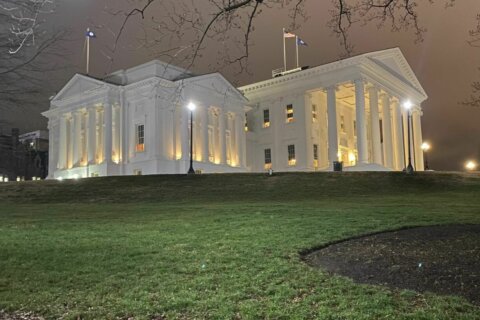Changes for redistricting in Virginia advanced Friday despite opposition from black lawmakers in the House of Delegates.
Narrow House approval of a proposed constitutional amendment that will now go to voters this fall was perhaps the biggest vote on a complicated day.
To keep certain bills alive, both the House and Senate treated Friday as if it were still Thursday for legislative purposes.
Top lawmakers also continued to work behind the scenes to agree on a two-year budget.
The session is supposed to end Saturday, but could be extended to allow for more time to review a final budget deal or to complete other work, like a schedule for raising the minimum wage and a process for local governments to move or contextualize monuments to the Confederacy.
Lawmakers did reach agreements by Friday night on bills including the “Clean Economy Act,” which aims to limit pollution and on plans to decriminalize simple possession of marijuana.
The sweeping legislation aimed at addressing environmental concerns also aims to eliminate emissions from power plants over the next 25 years, to reduce energy demand, allow for more renewable energy and set up a process where more discounts could be provided for low-income customers.
The pot possession changes would make it only a civil fine of $25 to have up to an ounce of marijuana for personal use.
Elections & Redistricting
The 54-46 House vote to endorse the constitutional amendment creating a bipartisan redistricting commission, including top legislative leaders from each party, came after nearly two hours of sharp debate.
Numerous black delegates spoke forcefully against the amendment, calling it a mistake that could eliminate minority representation in future decades and prevent a truly nonpartisan redistricting process.
“Hear our voices, please,” Del. Jeff Bourne said.
Del. Luke Torian of Prince William County said the amendment, and other legislation like it, “dims the hope” of black Americans to achieve the American dream.
An alternative offered by Del. Marcus Simon that included more protections, prevented lawmakers from serving on the redistricting panel, and that would have taken the Supreme Court of Virginia out of the process, was rejected 47-53.
If the change had been adopted, the amendment would not have gone to voters this fall. Virginia’s constitution requires the exact same language be adopted by the General Assembly twice, with an election in between, for an amendment to get on the ballot.
In the end, the original resolution passed with support from Republicans and some Democrats who said that while the amendment is not perfect, it is better than nothing.
The Senate allowed a version of the legislation putting the amendment on the ballot for voters this fall to be approved using House language, to avoid any other hiccups in the process.
Senate Democrats issued a statement praising passage of the amendment. The statement included support from three black lawmakers — Caucus Chair Mamie Locke, President Pro Tempore Louise Lucas and Jennifer McClellan — who praise the total package of the constitutional amendment and associated rules passed in a separate bill that the commission or lawmakers will have to follow.
The House voted along party lines early in the day, with Democrats in favor and Republicans against, to send a bill laying out strict redistricting criteria to the governor’s desk that would apply with or without the commission.
The bill effectively bans gerrymandering no matter how lines are drawn next year, Del. Cia Price and Del. Marcus Simon said, but could be changed by future General Assemblies for 2031 and beyond.
The bill specifically bans the totality of each General Assembly and Congressional map, on a statewide basis, from unduly favoring or disfavoring any political party.
The bill also requires protections in the process for racial and language minority groups, requires that districts be compact, and changes the process for counting Virginians who are in prison to count them at their previous address rather than at their location behind bars.
In other significant election-related changes, House and Senate negotiators agreed to pass a bill launching same-day voter registration in Virginia.
Voters would be able to register up to and including on Election Day at the local registrar’s office or at the polls.
Lawmakers are also advancing a bill that would institute a state-level voting rights act requiring most local governments to get approval from a judge or the state’s attorney general before making voting precinct or related changes.
The House and Senate are debating whether the bill requires additional funding in the state budget.
Plastic bag fee
Local governments could institute a 5 cent tax on plastic bags, similar to the fees in place in D.C. and parts of Maryland, under an agreement between the House and Senate.
The bill would allow counties or cities to implement the fee, which is aimed at limiting pollution starting on or after Jan. 1, 2021.
Retailers would get 2 cents out of the 5-cent fee in 2021 and 2022. After that, the bill matches other jurisdictions where stores keep 1 cent of the five.
The rest of the money would have to be allocated specifically for environmental cleanup or education, limiting pollution and litter or providing reusable bags to people who get food stamps or similar benefits.
Under another bill partly targeting litter, Fairfax County and Arlington would be able to hold grocery stores and others accountable for shopping carts that leave their property and end up tossed in creeks or elsewhere.
The local government would alert the company to go get their shopping carts, and, if the carts remain, the company could be fined or charged for cleanup.
The idea is to incentivize stores to do more to keep carts on their properties through systems like automatic wheel locks.
Insulin costs
A bill heading to Gov. Ralph Northam caps out-of-pocket insulin costs at $50 per month for people with health insurance.
The Senate amended the bill to raise the copay cap from the $30 initially proposed.
Animals
Changes to dog tethering rules would set new limits on leaving pets outside during extreme weather and require longer tethers for animals of at least 15 feet or four times the animal’s length.
The agreement between the House and Senate would bar outdoor tethering during hurricane, tropical storm or other weather warnings and when the temperature is over 85 degrees or below 32 degrees.
The bill has an exception if an animal control officer determines the animal would be safe from predators and is well equipped to tolerate its environment.
Another bill adds state pet store regulations to protect dogs and cats.
Workplace changes
All state workers will get cultural competency training aimed at reducing discrimination.
The bill originally proposed only covering the LGBTQ community, but was expanded after sponsors found out there was no similar existing required training to cover other groups.
Other changes on track to go to the governor’s desk include a bill holding general contractors responsible for unpaid wages by subcontractors in certain cases and a call for a report on changes that may be needed in state buildings to address active shooter response.
It appeared the House and Senate were nearing an agreement Friday that would allow any county, city or town or school board to opt in to permit collective bargaining for its employees, including teachers.
Jails
Several bills are advancing that ban the strip searching of children visiting Virginia jails and prisons.
Another bill with House and Senate agreement will require a public annual report on deaths behind bars.







